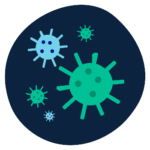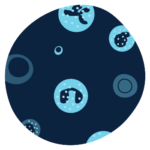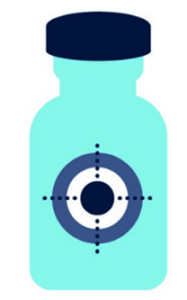There are many types of monoclonal antibodies. They can be referred to as a targeted therapy or an immunotherapy. Some monoclonal antibodies attach to a specific target on a cancer cell and stop it from growing. These are referred to as targeted therapies. They work by attaching to and blocking proteins on cancer cells (or other nearby cells) preventing cancer cell growth. Other monoclonal antibodies are called immunotherapy. They work by attaching to specific cancer cell proteins to tell your immune system to destroy those cells. They also slow down cancer cell growth.
Monoclonal antibodies may be given to people who are not suited to some chemo treatment due to its side effects. These may be given in combination with either chemotherapy or other targeted therapies. They are mostly given intravenously (IV), but some can be given subcutaneously (injection under the skin).
Monoclonal anti-CD20 antibody:
Rituximab and obinutuzumab are examples of monoclonal anti-CD20 antibodies.
- CD20 is a protein found on the surface of B-cells, it is found on the cell surface of some blood cancers
- this is termed CD20 positive
- the monoclonal anti-CD20 antibody connects to this protein on the blood cancer cell
- it destroys the cell by damaging the antibody, causing the cell to die
- it is used to treat Non-Hodgkin lymphoma (NHL), chronic lymphocytic leukaemia (CLL)
Monoclonal anti-CD19 antibody:
An example of a monoclonal anti-CD19 antibody is blinatumomab
Monoclonal anti-CD22 antibody:
Inotuzumab ozogamcin is an example of a monoclonal anti-CD22 antibody
Monoclonal anti-CD30 antibody:
An example of a monoclonal anti-CD30 antibody is brentuximab
- targets a protein called CD30
- sticks to the CD30 protein and delivers a drug to the cell to kill it
- used to treat Hodgkin lymphoma and some lymphomas
Monoclonal anti-CD38 antibody:
Daratumumab is an example of a monoclonal anti-CD38 antibody
- targets the CD38 protein on myeloma cells so the immune system recognises it and kills the cell
- used to treat myeloma
Monoclonal anti-SLAMF7 antibody:
An example of a monoclonal anti-SLAMF7 antibody is elotuzumab
- targets a protein on myeloma cells called SLAMF7
- directly enhances immune system activity to kill the myeloma cell
- used to treat myeloma
Bispecific T-cell Engagers (BiTEs):
Blinatumomab is an example of a bispecific T-cell engager
- combine 2 different monoclonal antibodies
- attach to 2 different proteins at the same time
- they attach to a protein on cancer cells and to a protein on immune cells
- the immune cells and cancer cells come into contact to help the immune system kill the cancer cells
- used to treat Acute Lymphoblastic Leukaemia (ALL)
Side effects from monoclonal antibodies tend to be different to chemo side effects. If you’re having more than one type of drug, you may have a few different side effects at different times. Your treatment team will talk to you about what you might expect.
Infusion related reactions (appear during or soon after infusion) of monoclonal antibodies may include:
- itching
- chills and/or fever
- nausea
- fatigue
- shortness of breath/cough
- facial swelling
- lightheaded
- chest pain
- rash/hives
- headache
Side effects (appear within days-weeks) of monoclonal antibodies may include:
- body aches and pains
- headache
- constipation
- diarrhoea
- rash
- low blood counts
- infection
- shortness of breath/cough
- an irregular heart rhythm called atrial fibrillation
- bleeding
Immune checkpoint inhibitors
Immune checkpoints are a normal part of the immune system. However, sometimes cancer cells can evade the immune system by binding to checkpoint proteins. Immune checkpoint inhibitors are a type of monoclonal antibody. They don’t kill cancer cells directly. They work by:
- blocking checkpoint proteins from binding
- preventing the cancer cell from evading the immune system
Types of immune checkpoint inhibitors:
- PD-1 inhibitors bind to the protein PD-1 on the surface of immune cells
- Pembrolizumab and nivolumab are examples of PD-1 checkpoint inhibitors
Immune checkpoint inhibitors:
Side effects of immune checkpoint inhibitors:
- rash
- diarrhoea
- fatigue
- inflammation (depending on the organ of your body that is affected):
- skin – changes in skin color, rash, feeling itchy
- lungs – cough, chest pain, shortness of breath
- bowel – stomach pain, diarrhea
- pancreas – diabetes, thirst, weight loss, blurred vision, fatigue
- liver – yellow skin, eyes
- pituitary gland – headaches, vision changes, nausea, vomiting
- heart – chest pain, shortness of breath, fatigue, irregular heart rate, swollen legs
- kidneys – high blood pressure, blood in urine, swelling in hands, feet, and face
- thyroid – fatigue, weight gain or loss, feeling cold, slow or racing heart rate, irregular heart rate
- nervous system – muscle weakness, numbness, trouble breathing
Some examples of immune system modulators are thalidomide, lenalidomide and pomalidomide.
Immune system modulators work in several ways:
- stimulate the immune system to attack and destroy cancer cells
- directly kills and stops the growth of cancer cells
- blocks growth of new blood vessels that supply the cancer cells
Immune system modulators are:
Side effects of immune system modulators:
- fever
- chills
- weakness
- dizziness
- nausea or vomiting
- muscle or joint aches
- fatigue
- headache
- blood clots
- nerve problems which may cause pain, numbness, tingling, swelling, or muscle weakness
- birth defects, if used during pregnancy


